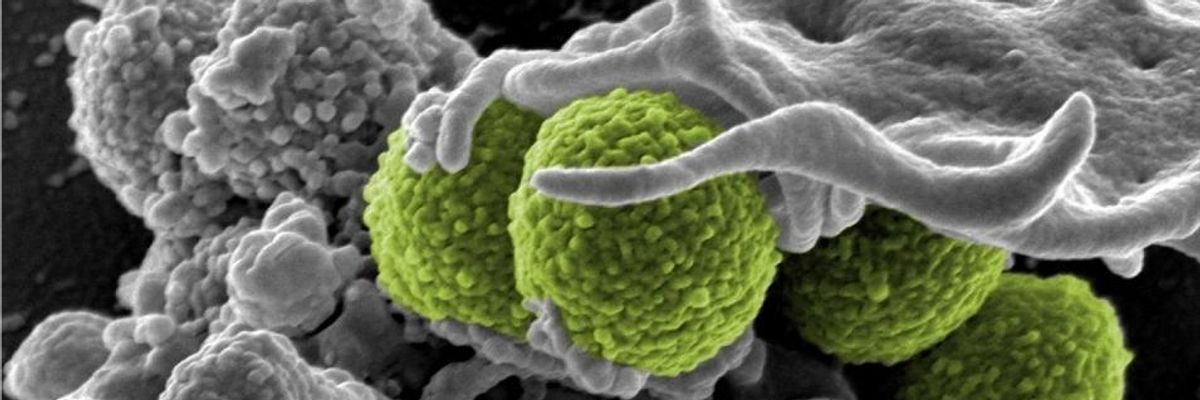More than a decade after the World Health Organization (WHO) began warning about its global threats, world leaders on Wednesday are gathering for a historic high-level meeting at the United Nations General Assembly, where they committed to a coordinated approach to discuss how to fight the scourge of "superbugs"--or antimicrobial resistance.
"We are losing our ability to treat infections," Dr. Keiji Fukuda, a senior World Health Organization official in charge of anti-microbial resistance, told Agence France-Presse.
"Not only does it threaten to increase deaths but our whole ability to handle patients is threatened. It also threatens our ability to grow enough food," he added.
"It's clear that if we don't begin to reverse it now, it's going to be much harder in the future," he said to NPR. "And this is why we are having this meeting at the General Assembly."
As CBC News reports: "It's rare for a health topic to reach this level at the UN. The Ebola and HIV epidemics and noncommunicable or chronic diseases such as heart attacks and stroke, cancer, diabetes and asthma were the other instances."
Fukuda told NPR he's hoping world leaders will see the threat of superbugs on par with that posed by climate change.
According to BBC News, signatories to the "landmark declaration" will "have two years to report back with an action plan."
"Antimicrobial resistance poses a fundamental threat to human health, development, and security. The commitments made today must now be translated into swift, effective, lifesaving actions across the human, animal and environmental health sectors. We are running out of time," said Dr, Margaret Chan, Director-General of WHO.
A fact sheet from the WHO states:
Antimicrobial resistance occurs naturally over time, usually through genetic changes. However, the misuse and overuse of antimicrobials is accelerating this process. In many places, antibiotics are overused and misused in people and animals, and often given without professional oversight. Examples of misuse include when they are taken by people with viral infections like colds and flu, and when they are given as growth promoters in animals and fish.
The U.K. government-commissioned Review on Antimicrobial Resistance estimated that at least 700,000 people die each year as a result of drug resistance in illnesses such as bacterial infections, malaria, and tuberculosis.
New findings released just this month highlight the urgency of the problem.
A report released this week by a coalition of environmental and public health organizations found that pharmaceutical companies are contributing to the rise of superbugs through their industrial waste which pollutes local soil and water systems, thereby interacting with local bacteria.
Also, a Reuters investigation published earlier this month found "the United States hasn't taken the basic steps needed to track drug-resistant infections," thereby "hindering the nation's ability to fight a scourge that exacts a significant human and financial toll."
And a new study published Wednesday found that the superbug Methicillin-Resistant Staphylococcus aureus (MRSA) may spread to humans who have no contact with livestock. According to Lance Price at the Milken Institute School of Public Health at the George Washington University, who helped lead the new study, the findings have implications for pending trade deals--and show the need to rein in antibiotic overuse in livestock.
"We need to expand the number of pathogens that we test for in our food supply, and we need international leadership to reduce unnecessary use of antibiotics on industrial farms around the world," Price stated. "Superbugs don't respect political or geographical boundaries, so we have to work together to address this public health threat. I'm not sure that our international trade agreements are prepared to handle the specter of superbugs in meat."

